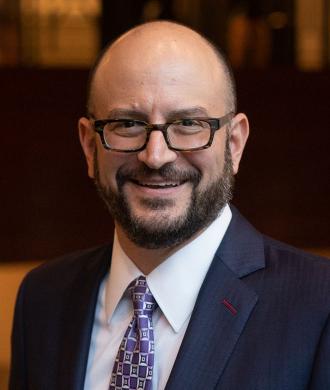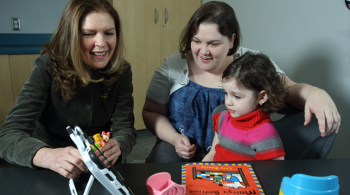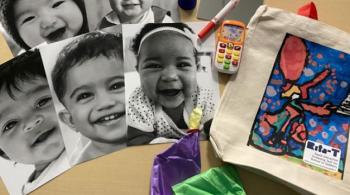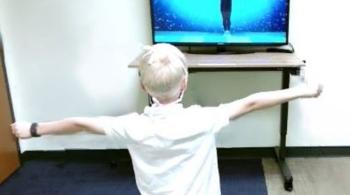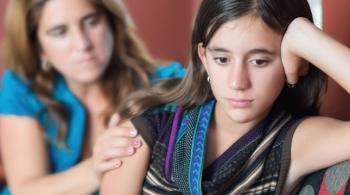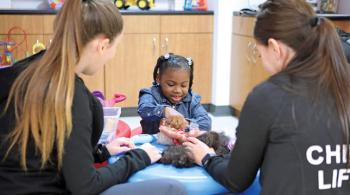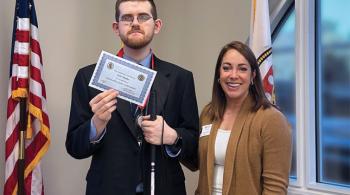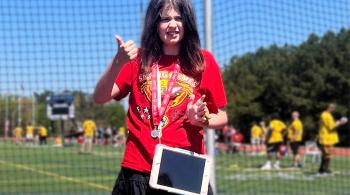May is Children’s Mental Health Awareness month and as part of that recognition, join Dr. Brad Schlaggar, president and CEO of Kennedy Krieger and his guest Dr. Matt Edelstein, director of the Brief Treatment Clinic at the Institute, as they discuss challenging behaviors in children and how those behaviors can have a cascading impact at multiple levels of a family system.
For the child, such behaviors can impede social, emotional, and academic functioning. For caregivers, they can influence stress, mood, feelings of confidence, and even undermine a sense of parental competence. Aggressive behaviors can cause injury.
Finally, for the family as a whole, challenging behaviors can tax relationships and have negative repercussions both within and beyond the walls of the household.
Learn More About Our Featured Speakers
Learn More About Our Featured Speakers
View Episode Transcription
Dr. Brad Schlaggar (BS): Welcome to Your Child's Brain, a podcast series produced by Kennedy Krieger Institute with assistance from WYPR. I'm doctor Bradley Schlaggar, pediatric neurologist and president and CEO of Kennedy Krieger Institute. Young children rarely have the words or communication skills to say clearly what they need, want, or feel. They let adults know their wants and needs through their behavior. As adults, we recognize some of these communications right away like a smile showing a child's happiness. Navigating and understanding child behaviors is for many new parents, a rite of passage. For example, infants will fuss or cry despite efforts to comfort them. Toddlers sometimes hit, bite, fall to the floor with a tantrum or simply say no to seemingly every request. Some preschoolers will argue or fight over toys, struggle to follow directions or become overly aggressive as they play. All of these behaviors can be part of typical child development. But how do parents know what constitutes normal child behavior? How does one separate typical behavior from more concerning or so called challenging behaviors that negatively impact both the child and the family environment. By challenging behaviors, I'm referring to behaviors that are aggressive. Defiant, property destructive, self injurious, highly stereotypical, transition related and others. While challenging behaviors are not uncommon in typically developing children, they are fairly common in those with intellectual and developmental disabilities. With an estimated 10-20% of children with intellectual and developmental disabilities, having one or more such behaviors. The rate is higher in children with autism spectrum disorder, and in general, the rate of challenging behaviors increases with the age of the child. May is Children's Mental Health Awareness Month. As part of that recognition in this month's episode, we're going to discuss challenging behaviors in children and how those behaviors can have a cascading impact at multiple levels of a family system. For the child, such behaviors can impede social, emotional, and academic functioning. For caregivers, they can adversely influence stress, mood, productivity, and even undermine a sense of parental competence. Aggressive behaviors can, of course, cause injury. For the family as a whole, challenging behaviors can tax relationships and have negative repercussions both within and beyond the walls of the household. We'll also discuss the obstacles caregivers face in seeking support for their children with challenging behavior. There's a lot to navigate, ranging from conflicting information about available services to difficulty locating providers equipped to manage high intensity behaviors. Many families report that there is rarely a straight line available to evidence based, effective behavioral care. Today, I'm joined by one of my exceptional colleagues at Kennedy Krieger Institute. That's doctor Matt Edelstein, a licensed behavioral psychologist and behavioral analyst. He's the director of the Brief Treatment Clinic at Kennedy Krieger Institute, and he's also an assistant professor in the Department of Psychiatry and Behavioral Sciences at the Johns Hopkins University School of Medicine. It's also my pleasure to welcome Ashish and Sarayu, parents of Siddharth. Welcome, everyone. Matt, let's start out with some definitions. What do we mean by the term challenging behaviors in children?
Dr. Matt Edelstein (ME): Challenging behavior can really refer to anything. It can be behaviors that are disruptive, aggressive, as you mentioned, or they can be behaviors that cause distress or conflict at home between siblings or parents. Really anything that can cause impairment in the home and for the family can represent a challenging behavior.
BS: In general, what causes challenging behaviors?
ME: Challenging behavior is often caused by a variety of factors. But the way that we tackle challenging behavior in our work is we look at the environment. Oftentimes the environment can create context for challenging behavior to occur. You mentioned in the beginning of your commentary that children are often looking for ways to express their wants and needs. Challenging behavior is one form of communication. We may actually be supporting challenging behavior in the way that we respond to children because as parents, we want to minimize their distress and oftentimes that means interacting with them in the context of those behaviors.
BS: Let's take a little bit of a step back and consider these challenging behaviors in the context of brain development, the way the brain's development unfolds over, say, the first months or years of the child's life, how does that affect that development affect the emergence of behaviors that are both challenging as well as adaptive?
ME: Young children are very affected by the environment and other people as their brain is developing. It's very common for us to see challenging behavior emerge even before language emerges. Think of a young infant crying to express their needs of hunger or feeling uncomfortable. These are all behaviors. Young children, infants engage reflexively. They have behavior because they have needs that are necessary for their survival. As children develop and grow, sometimes those behaviors persist because they continue to work for them. As their environment comes to accommodate those behaviors or reinforce those behaviors, they may actually persist longer than most families would anticipate.
BS: Let's build on that. You mentioned how in infancy, even prior to language emerging, you can start to see the beginnings of challenging behaviors. Let's talk more about how behaviors emerge at different ages and stages of development, and when do particular types of behavioral issues typically start in children.
ME: Certain types of behaviors like crying or things like biting may emerge from just children exploring their environment. Even at a very young age, children are looking at how those behaviors are impacting their efforts to communicate. If crying is helpful in having parents rush to a child's side to provide food or to provide comfort, that's strengthening that behavior. As children are continuing to explore their environment, certain types of behaviors may continue to be reinforced this way. If you think about a child accidentally banging their arm or a child coughing, oftentimes as parents were running in to provide support during those common occurrences of young childhood, but those connections and those pairings are starting to be made. In the absence of language development or sometimes even in the context of language development, people are still even young children still doing the things that seem to be the most efficient, the behaviors that produce the most immediate change in their caregivers behavior or in their environment. That's really how challenging behavior starts. It starts through that strengthening process.
BS: What are the most common challenging behaviors that bring families to you? Maybe you could share a vignette or two about the ways that different children will clinically come to your attention.
ME: Children come to us for a variety of different reasons. Oftentimes it's for a challenging behavior that feels more than a caregiver or a family system can manage. In that way, there are no two clinical pictures that are identical because each family system has its own experience with these things and its own context for dealing with them. Sometimes it might be something like a child who's very hyperactive or impulsive in a family system that has a lot of expectations around what the child should be doing in certain community settings. Other times, it's a child who is very aggressive or may be tantruming for hours on end, seemingly unable to regulate themselves, oftentimes, by the time a child comes to our program, parents really feel like they've tried a variety of different things in their toolbox. Perhaps they've read online or sought out other types of community supports, and oftentimes those are not sufficient to really help the family navigate these issues.
BS: When the child does come to your attention, how do you sort out whether a challenge of behavior that's being described is part of typical child development or is something that is going to require some form of clinical intervention?
ME: I think it starts with having a really thorough assessment of what it is that the family is reporting. We do that by interviewing the family by doing some pretty comprehensive observations, and as appropriate, reaching out to other stakeholders or caregivers like teachers or school. That helps us give a nice picture of whether these behaviors that are being reported are really impairing the child's ability to function in all of these environments. As you mentioned, it's not uncommon for children to tantrum or to engage in some mild disruptive behavior. But when we start to observe that there's a real impact on the family or on the child's ability to interact with their peers, for instance, oftentimes, that'll look like kids spending time out of the classroom because they're being disciplined or even being thrown out of their daycares or preschools because the staff in those centers are not able to support those kids. That'll give us a really helpful indicator that these issues are a little bit more than what we would expect in childhood.
BS: Before we go on to discuss treatment and therapies for challenging behaviors, I'd like to bring in Siddharth parents, Ashish, and Sarayu into this discussion. Maybe we could start out with sharing with us. I should say, thank you for joining and being willing to talk about these behaviors which coming to clinical attention, they must have been challenging. We appreciate your willingness to be here and part of the discussion. Tell us about Siddharth.
Sarayu: Siddharth in a lot of ways is a very typical nine year old little boy. We have an older daughter who's 11.5. Siddharth just turned nine last week. He loves basketball, he plays soccer, he loves music. He's a little bit of a clown. He has a funny sense of humor. If someone asked me, what is your little boy like? That's what he's like.
BS: What concerns did you have that brought you to Kennedy Krieger to be seen clinically? When in retrospect, did you notice these behaviors start to emerge?
Sarayu: There's a long answer and a short answer. If you want to know what brought us to Kennedy Krieger initially, that started about five years ago. I had a normal pregnancy and a normal delivery with Siddharth. I at first thought it was an aggressive pediatrician, but at eight months, she started pointing out all these things to me and she said, "He's not doing this and he's not doing that." We initially were referred to Howard County services for various evaluations, and they came up with this broad overarching diagnosis of he has developmental delay. We were fortunate because we did have services from the county. He was set up with a speech therapist and occupational therapy. He was placed also by the time he was three in the county preschool. But there was a huge disconnect between what school teachers and daycare teachers saw in terms of his behavior and what we experienced at home. A lot of it at first, I would ascribe to the fact that he couldn't talk and he didn't talk until he was over three. I said a lot of his behavior that was challenging for us, temper tantrums, being physically aggressive. This is because he can't talk, and he can't make himself understood. It made sense and in some ways, we let some of the behavior go. But then as his speech skills improved, the behavior worsened. But nobody at school saw it. He was a model child in front of his school teachers and everything. Nobody believed us. When I spoke with his pediatrician as he got older, she was also very concerned that, for a different diagnosis than just a developmental delay so she sent us to Kennedy Krieger. Of course, that was just when COVID started. Our journey may have been extended because of the circumstances, but that's where we ended up.
BS: Can you share some specific ways that the clinics or Dr. Edelstein, Matt's, suggestions or recommendations positively impacted Siddharth, and therefore, your family?
Sarayu: It's like I have a different child, and just even after the first two weeks or so of seeing Matt. We see him twice a week for a few hours each time, and, I don't have a child that's punching holes in the wall or cutting up textbooks or drawing on things. I don't have to pull over onto the side of the road because he can't keep himself together. Ashish and I think that the aggression has pretty much disappeared, at least on a daily basis.
Ashish: If I may add an experience with the Kennedy Krieger Institute and what we have gone through the process of it's almost a reform, and it's been a life changer, not just for our son, but for our family as a whole. One of the most revealing things aspects of this was that it is as much about training the parents on how to deal with the kid, as much as it is to change the kid's behavior. We are now equipped with the necessary framework and the tools to manage and continue to help our kid have a better behavior as he grows older.
BS: That really reinforces what Matt said before about that often we as parents will unwillingly reinforce behavior, so we have to change as our child is changing in order to get out of that loop. That process takes some time. Ashish, how do you describe from the time course for seeing the improvement and let's say the aggressive behaviors that you were describing?
Ashish: It's been quite a journey. We have been working with Matt for the last four to five months. From the get go, even after a few sessions, we started seeing change in our son, that's continued to happen. Of course, we had to be persistent in implementing the rules and the techniques that we learned in the clinic with Matt. We took that to our home setting and we practiced that on a daily basis with Siddharth that's now, paid dividends, and he's a completely different child.
BS: What would you say to other parents who have similar concerns with their own children and are wondering if this is in general pathway that they might want to take.
Ashish: Parents need to be more proactive about recognizing their kids challenges, but also seek out help. Talk to as many folks as possible both on the friend side, but also the clinical community and try to learn as much as you can about what's available, how you can help your kid. I think it's also very important that the parents should not perpetuate their kids behavior and give in to their tantrums because that's the easy way out. It's a hard process, it's a hard journey, but you have to stick with it and go through that process.
Sarayu: I just wanted to add to that. Both Ashish and I are in the medical field. In some ways, I felt that we had a little bit of being in the know. But I've seen several of our friends struggle, and a lot of our friends have told us, if I didn't have a child already that was more typically developing, I would never have recognized the same signs in our younger child. Even in our case, I had to fight with teachers to say no, you don't understand what he's like at home. You really don't. I had a preschool teacher come to my house to watch him and she saw it, and then she understood. But I had to keep talking to her and talking to her. I feel that other parents who are in similar situations should just say, I know my child, and I see other children, and this doesn't seem right and I may not have a name for it, but I don't know what to do, and it doesn't seem right to me and it is really impacting us.
BS: Persistence is so important. How would you describe your strong sense of hope, now for the future for Siddharth and for your family?
Sarayu: What we hope is that we can continue on the same trajectory that we have had so far. I know that it's not a straight line up. I know that it could be two steps forward and maybe 10 steps back. We don't know. As he grows and his needs change, I feel that we can still take the tools that we've been given and the strategies that we've been shown to grow with him. We might need to acquire more tools in our toolbox. But I think we have a good foundation, and we know we have a good starting point.
Ashish: We have come a long way from sometimes feeling hopeless to now feeling hopeful about the future for Siddharth. That's a big change. We continue to look forward to what he's going to evolve into and we have the right framework and the skill sets to adapt and evolve with him.
BS: Thank you both. I really appreciate you're sharing Siddharth's story. Matt, let's take a moment and talk about behavioral therapies, especially applied behavioral analysis or ABA. What is ABA and is there an evidence basis for its effectiveness?
ME: ABA, applied behavior analysis is really just the science of human behavior. While ABA is typically thought of as being an intervention for individuals with autism. It is not limited in that way. It's a science of learning, and the work of applied behavior analysis involves carefully individualizing and understanding presenting issues and developing customized treatment packages to address those through teaching new skills.
BS: Can you dive in a little bit more on and give an example of a behavior and then the interrogation that you might go through to understand the drivers for that behavior and how that might lead to intervention?
ME: Absolutely. We can take something like tantrums, which is a very common behavior and can range in a variety of different intensities and durations. But really, when we're interested in a specific behavior, we want to understand the why behind the behavior. Our assumption when we're going into this work is that behavior is happening for a reason. As I suggested before, it's often a form of communication for the individual. Through talking to caregivers, but more importantly, through direct observation and really careful data collection, we're able to understand the why question. Why is that behavior happening? Then we have a really tailored intervention that teaches a replacement skill. For instance, if a tantrum were occurring because a child was interested in accessing their parents' attention, we would teach them a new way to communicate that need, either through vocal communication or for children who are non-vocal, we would use a card exchange any way to create a more efficient, more adaptive means of getting that need met. What we find when we're able to do that well is challenging behavior doesn't need to persist because we've replaced it with something that works better, faster and is more acceptable for the family, and that's where treatment really starts.
BS: I mentioned at the very front end about the increased prevalence of challenging behaviors in children with intellectual and developmental disabilities. Do children with those conditions have different types of behavioral challenges than say, typically developing children, and if so, what are the implications for treatment approaches?
ME: Sometimes they do, and it really depends on a lot of factors, including perhaps their sensitivity to pain, or their social cognition, whether they're tuned into how others are perceiving them. A lot of that will shape the extent that an individual may go to to get their want or need met. It's also worth noting that a lot of individuals with developmental and intellectual disabilities have delayed communication and so that tends to go hand in hand, and I think you heard Siddharth's parents note that as well. That in the absence of that communication development, we see challenging behaviors persist and start earlier because those wants and needs are still there even if the child doesn't have a great way to articulate them.
BS: How would you describe how family dynamics may impact the approach that you might take in treating challenging behaviors?
ME: I think it's essential. As was suggested, this work really can't happen without families and caregivers. On the one hand, it's essential to treatment planning because we really need to understand the values and the perspectives that parents are taking in their parenting. We want to try to respect those and really build on those that existing foundation that's already there. On the other hand, what we talked about is that, this is a lifestyle change for a lot of families. Just like there are specific things that reinforce child behaviors, there are things that reinforce caregiver behaviors, too. Caregivers, we don't want our children to be in distress or we may be juggling multiple demands and need tantrums to stop in their tracks because they're overwhelming and taxing the system. Families may be doing things that they intuitively know probably isn't the best way to respond in a given situation, but the stressors of the environment are causing them to have to act in that way. We want to respect those critical pieces of the family dynamic while still helping them move towards that lifestyle change that's going to predict better outcomes for them in the future.
BS: We've been focusing on behavioral therapies. What is the role for medication for treating challenging behaviors?
ME: Medication can be an incredible benefit to the work that we do. Obviously, I'm not a physician, so that's not a part of my area of competence, but we work collaboratively with psychiatry and developmental pediatrics because medications can really create a nice availability for learning. Said another way. Sometimes kids are so disregulated or impulsive or hyperactive that it's hard for them to really take in the environment in order to learn from it. Medications can be a crucial first step towards that foundation for learning. Then we can really see those behavioral therapies take off.
BS: That point that you just made is a theme for many of the episodes of this podcast. The interaction between behavioral and pharmacotherapies often yielding a better outcome than either one by themselves, really for exactly the reasons that you just stated. Matt, you lead the Brief Treatment Clinic. That's the name of it. The Brief Treatment Clinic at Kennedy Krieger. Can you comment on what is meant by that language, brief treatment and what types of behaviors benefit from a brief treatment versus the kinds that might require longer-term approaches?
ME: Yes. The Brief Treatment Clinic was created as a way to support families who really required an intermediate level of care. By brief, we refer to just how many calendar days we program our treatment courses. Our clinic is meant to accelerate behavior change by having families spend more time in treatment more quickly. It's not uncommon for families to come in for daily or twice weekly appointments for multiple hours at a time. What that really does is it gives them the opportunity to develop skills quite quickly. The caregivers are learning right alongside their child. We base that on what we know about learning in general, that if we have to learn something new, it's best to be immersed in it, to get a lot of feedback and coaching in it. Sometimes standard one hour week outpatient models aren't enough for the needs that our families are coming to us with.
BS: What do you mean or what do we mean by this family systems therapy?
ME: I think what that refers to, there's a lot of things that is probably meant by that term. But the way I understand family systems therapy is this idea that behavior is multi directional, as we've been talking about. That child behavior is going to influence all of the stakeholders in a family, and those stakeholders are in turn going to influence the behaviors of the child. Even though it would be convenient to have one patient and just think about that one person's issues, people exist within a system and within an environment, and it's really only when we're able to help that environment work for all of the stakeholders that we're able to really create lasting change.
BS: Matt, last question. Is there research being done on challenging behaviors in children and the impact that those behaviors have on the family? What's the leading edge of research in this area?
ME: Yes, there is a lot of research in this area and a lot happening in the Department of Behavioral Psychology. We try to understand efficient models for creating lasting behavior change, we try to understand how to use the tools that we have at our disposal, which is really the session room, the appointment structure, our teaching procedures, how to make that efficient and helpful for families, how to minimize the amount of time that it takes for families to see a positive result and how to disseminate that information to other settings so that even though we're able to highlight the model for doing this that other community providers can do this work as well.
BS: Well, that's an excellent place to end. I want to thank our guests, Dr. Matt Edelstein, and Siddharth's parents, Ashish, and Sarayu. We hope that you our listeners have found this discussion about challenging behavior in children interesting, and informative. Please check out our entire library of topics on your child's brain at Wypr.org, KennedyKrieger.org/ycb or wherever you get your podcasts. You've been listening to Your Child's Brain. Your Child's Brain is produced by Kennedy Krieger Institute with assistance from WYPR and producer Spencer Bryant. Please join us next time as we examine the mysteries of Your Child's Brain.

